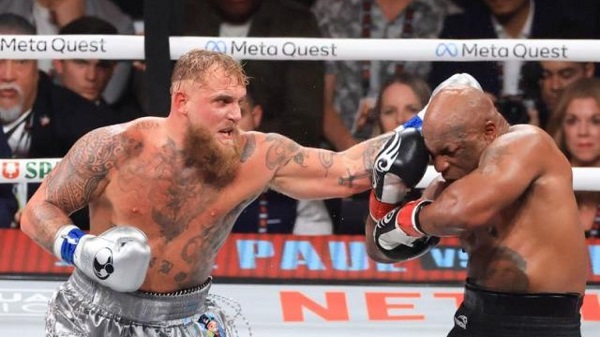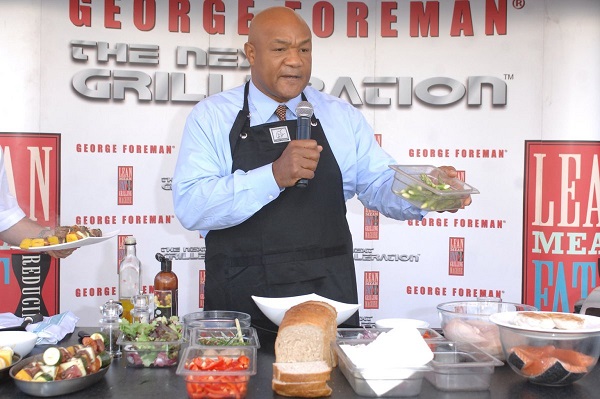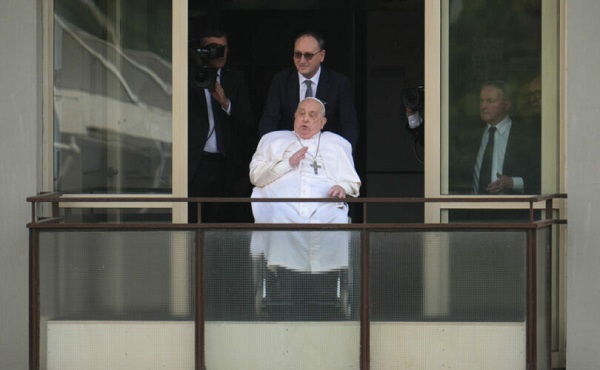Bruce Dowbiggin
Check Out Time: Knowing Enough Is Enough

“An aged man is but a paltry thing,
A tattered coat upon a stick, unless
Soul clap its hands and sing, and louder sing
For every tatter in its mortal dress”. W.B. Yeats
Damn that Tom Brady. Because of the now-retired NFL GOAT it is widely believed that an athlete in his 40s can still triumph over younger men. That a good diet, plenty of sleep and keen desire can sustain you against twenty-two year olds. It ain’t so.
Those needing a reminder of what nature intends for athletes pushing their 40s— and later— got a sobering reminder the past while. First on the docket was Mike Tyson, the former heavyweight champion and a man who inspired fear the way Taylor Swift inspires teenage girls and vapid prime ministers.
In an effort to shake his aging fist at time, the 58-year-old Tyson agreed to fight 27-year-old media-influencer-turned-boxer Jake Paul. Tyson has been through a lot since his days when opponents barely lasted a minute in the ring with him. He lost his crown, married actress Robin Givens and had what was clearly a breakdown both physically and mentally.

In recent years he’s re-invented himself by playing Mike Tyson in movies (his tiger is stolen by a dentist in The Hangover) and on Broadway. He’s evolved into some sort of Cormac McCarthy sage, unflinching in the face of his mortality. Here he talks to a very young interviewer about his legacy and his wish to have no part of one. His precise words were, “”I don’t believe in the word ‘legacy.’ I think that’s another word for ego. Legacy doesn’t mean nothing. That’s just some word everybody grabbed on to.”
So the decision to take on Paul, who has only a dozen pro fights, in a Netflix special drew a lot of curiosity. With his facial tattoo and still-impressive physique he made many believe he could summon up enough to defeat a showboating Paul (El Gallo) who played the heel in the run-up.
Then Tyson had an ulcer flareup. Which caused him to lose half the blood in his body. The fight was delayed from July to November 15 at AT&T Stadium, home of the Dallas Cowboys. Videos of Tyson training seemed to show that, even after the medical issues, he could still deliver enough firepower to make the fight credible. For good measure, Tyson slapped Paul during the weigh-in. Just like the old days.
On fight night sixty-five million tuned in. But the Tyson of old was now old Tyson. He had little to offer, and, by fight’s end, Paul was toying with Tyson. The unanimous decision was a forgone conclusion. Even in defeat Tyson declared himself satisfied having shown his family and himself he could credibly train for a fight after his medical problems.
But the big winner was Father Time.
The Big Guy is also wining in his bet with legendary QB Aaron Rodgers who vowed in 2022 to make the Green Bay Packers regret letting him go in favour of Jordan Love. Rodgers, who’s almost as quixotic as Tyson, signed with the New York Jets who felt themselves only a QB away from a playoff berth or even a trip to the Super Bowl.
That dream lasted just four plays into the Jets first game of 2023. The elusive, rifle-armed Rodgers sat pathetically on the turf, his season done with a torn achilles tendon and the Jets hopes delayed for a year. During his convalescence there were rumours of an early comeback. None came.

So this September the expectations were palpable for Rodgers, now 40, to finally lead their Jets to success. It took only a few games to note that, while he could still throw a great football, Rodgers could not move as he once had in the pocket. He was sacked pitilessly by opponents. The rival Buffalo Bills pounded the Jets, leaving them far behind the the AFC East standings.
At which point Rodgers’ enigmatic personality become the story in the catty New York press. As first the coach, Robert Saleh, and then the GM, Joe Douglas, were fired. Stories emerged that Rodgers was calling the shots with ownership. Fans turned on him. This past week the 3-8 Jets made the internal decision to cut ties with Rodgers at season’s end.
Will someone sign this version of Rodgers for 2025? Sure. And Joe Biden will regain his faculties. Rodgers’ hopes to “not go gentle into that good night” will not be his call.
Finally, there was the news this week that 39-year-old Alex Ovechkin of the Washington Capitals had suffered a broken fibula and would miss 6-8 weeks. However you feel about Ovechkin’s friendship with Putin , there was admiration for his relentless pursuit of Wayne Gretzky’s record for most regular-season goals (894) in a career.

After a slow start the Capitals captain was on pace to break the record sometime in February. Then came the leg-on-leg collision with Utah’s Jack McBain. In his first 19 seasons Ovie had missed just 35 games to injury. Now this. But that’s how it goes as a 39-year-old playing a young man’s game.
There’s a good chance he now may have to wait till next year— when he’s 40— to break the mark. Ask Aaron Rodgers how that 40-something coming-back-from injury thing works.
At least there was one great athlete accepting the encroachment of 40. Rafael Nadal wound up his brilliant career at the Davis Cup after winning 22 Grand Slam tournaments. “I don’t have the chance to be competitive the way I like to be competitive,” he said in a news conference. “My body is not able to give me the possibility.”

The now-retired Roger Federer, who saw his lead over Nadal in Grand Slams go from 6-12 to 20-22, summed up Nadal. “You beat me — a lot. More than I managed to beat you… You challenged me in ways no one else could.” You could also say he got out while the getting was good. For that, Rafa, clap hands and sing.
Bruce Dowbiggin @dowbboy is the editor of Not The Public Broadcaster A two-time winner of the Gemini Award as Canada’s top television sports broadcaster, he’s a regular contributor to Sirius XM Canada Talks Ch. 167. His new book Deal With It: The Trades That Stunned The NHL And Changed hockey is now available on Amazon. Inexact Science: The Six Most Compelling Draft Years In NHL History, his previous book with his son Evan, was voted the seventh-best professional hockey book of all time by bookauthority.org . His 2004 book Money Players was voted sixth best on the same list, and is available via brucedowbigginbooks.ca.
2025 Federal Election
Chinese Gangs Dominate Canada: Why Will Voters Give Liberals Another Term?

There’s an old joke that goes, the Japanese want to buy Vancouver but the Chinese aren’t selling. Glib, yes. But with enough truth— Chinese own an estimated 30 percent of Vancouver’s real estate market— to pack a punch; Especially in this truncated rush to anoint Mark Carney PM before anyone finds out exactly who’s his Mama.
The advertised narrative for this election is Donald Trump’s vote of no confidence in the modern Canadian state. A segment of Canadians— mostly Boomers— see this as intolerable foreign interference in the country’s sovereignty. So rather than look inward at why Canada’s closest partner is fed up with them the Liberal government has chosen a pep rally rathe than any uncomfortable questions.
Namely about Chinese interference in Canada’s politics, the distortion of real-estate prices in Canadian urban markets, the exploitation of banking and the thriving drug trade that underpins it all. And how it’s driving a wedge between generations in the nation. As we like to say, Canada’s contented elites have been sitting in first class for decades but only paying economy.
They’d like you to forget insinuations that Canada is a global money-laundering capital. Better to blame Trump for the “willful blindness” that has Americans and others losing trust in Canada to keep secrets and contribute its fair share tom protecting against the growth of China. (The same geopolitical concern that saw Trump kick the Chinese out of the Panama Canal Zone.)
Thanks to the diligent reporting of journalist Sam Cooper and others we know better. And it’s ugly. An estimated trillion dollars from Chinese organized crime has washed through Canada since the 1990s. They’ve used underground banks and illegal currency smuggling to circumvent the law. They’ve bribed and intimidated. And they’ve poisoned elections.
This penetration of the culture/ economy by well-organized Asian criminal gangs have been around since the 1990s, but under Trudeau they hit warp speed. By the time Trump inconveniently raised the issue of border security in January, Canada’s economy could fairly be characterized as a real-estate bubble with a drug-money-laundering chaser. The Chinese Communist Party now operates “police stations” in many Canadian cities to supervise this activity and report to Beijing.

In his 2021 book Willful Blindness (and subsequent reporting) Cooper patiently records this evolution with brazen Asian gangs using casinos in BC and Ontario as money-laundering outlets to wash drug money and other criminal proceeds, turning stacks of dirty twenty-dollar bills into clean hundred-dollar bills or casino chips. (When Covid closed the casinos they used luxury mansions as private casinos.)
All financed by underground banks and loansharks. This process became known internationally as The “Vancouver Model” to help establish Chinese proxies overseas and extend the CPP ‘s reach. Hey, the real estate kingpin is named Kash-Ing. (Kaching!) It’s currently being used to buy farm properties in PEI, much to the anger of residents (who will still vote Liberal to protect their perks.)
While investigators and some authorities attempted to expose the schemes the perps were protected by compromised government officials, corrupt casino employees and the inability of courts to deliver justice. It’s why Canadians were so shocked that TD Bank was fined $3B in the U.S. for allowing money laundering. “Not us! No way! We’re Simon pure”.
Much of this money ended up in Canada’s feverish real-estate market, with vacant properties creating insane price spirals across the nation. It’s driven the inability of under 40s to buy homes— another major crisis the Liberals are trying to disguise under Mark Carney the compliant banker. Still more of the proceeds were used to build stronger drug-supply chains between Asia, Mexico and Canada— with heroin and fentanyl then distributed to the U.S. and in Canada.

Against this explosion of housing and drug debt were stories of the political influence of these gangs into the Canadian system. The sitting Canadian prime minister, who praised the Chinese form of governing before he reached the PM post, has been seen in photos with underground Asian gang figures. As were previous Liberal leaders like Jean Chretien who made no secret of his lust for the Chinese market. Chinese money was used to build extensively in Chretien’s Shawinigan riding.
Donations to Trudeau’s Montreal riding association and to the Trudeau Foundation were favourites of shadowy Chinese figures. “In just two days (in 2016), the prime minister’s (Outremont) riding received $70,000 from donors of Chinese origin, and at the same time, the government authorized the establishment of a Chinese bank in Canada,” Bloc leader Yves-Francois Blanchet said on Feb. 28.
Donations to Trudeau from all across Canada constituted up to 80 percent of the riding’s contributions that year. In May 2016, one such fundraiser saw Trudeau hosted by Benson Wong, chair of the Chinese Business Chamber of Commerce, along with 32 other wealthy guests in a pay-for-access event. The patterns exposed by Cooper finally prompted a commission by Quebec justice Marie-Josée Hogue looking into Chines interference in Trudeau’s successful 2019 and 2021 elections.

An interim report released last year by Hogue determined that while foreign interference might not have changed the outcome of Canada’s 2019 and 2021 federal elections, it did undermine the rights of Canadian voters because it “tainted the process” and eroded public trust. So petrified was Trudeau of the full Hogue Report that he prorogued parliament for three months and handed in his resignation rather than test his 22 percent approval rating in a Canadian election. Or his luck with the courts.
Luckily for Liberals Trump came along to smoke out Trudeau and allow for the current whitewash of the party’s record since 2015 under Carney. So instead of agreeing with Washington about Canada’s corrupted economy Canadians have decided to engage in a Mike Myers nostalgia fest for a nation long gone. A nation overly dominated by its smug, satisfied +60 demographic that sits back on its savings while younger Canadians cannot get into the economy.
Reaching past the sunset media to those people is Pierre Poilievre’s task. He has a month to do so. For Canada’s long-term prospects he’d better succeed. The Chinese are watching closely.
Bruce Dowbiggin @dowbboy is the editor of Not The Public Broadcaster A two-time winner of the Gemini Award as Canada’s top television sports broadcaster, his new book Deal With It: The Trades That Stunned The NHL And Changed hockey is now available on Amazon. Inexact Science: The Six Most Compelling Draft Years In NHL History, his previous book with his son Evan, was voted the seventh-best professional hockey book of all time by bookauthority.org . His 2004 book Money Players was voted sixth best on the same list, and is available via brucedowbigginbooks.ca.
Bruce Dowbiggin
From Heel To Hero: George Foreman’s Uniquely American Story

“The more you learn, the more you realize how much you don’t know.”— George Foreman
For those who thought Donald Trump’s role progression (in WWE terms) from face to heel to face again was remarkable, George Foreman had already written the media book on going from the Baddest Man in the World to Gentle Giant.
It’s hard for those who saw him as the genial Grill Master or the smiling man with seven sons all named George (he also had seven daughters, each named differently) to conjure up the Foreman of the 1970s. He emerged as a star at the 1968 Olympics, winning the gold medal in heavyweight boxing. His destruction of a veteran Soviet fighter made him a political hero. In an age that already boasted a remarkable heavyweights Foreman was something unique.
Muhammad Ali, Joe Frazier, Ken Norton, Ron Lyle and Jimmy Ellis were still bankable household names for boxing fans— but on the downside of famous careers. They each had their niche. Foreman was something altogether different. Violent and pitiless in the ring. Unsmiling as he dismantled the boxers he met on his way to the top. He was the ultimate black hat.
With the inimitable Howard Cosell as his background track , he entered the ring in 1973 against the favoured ex-champ Frazier, coming off his three epic fights with Ali. While everyone gave Foreman a chance it was thought that the indomitable Frazier, possessor of a lethal left hook, would tame the young bull.

Instead, in under two rounds of savagery , Foreman sent Frazier to the canvas six times. Cosell yelled himself horse crying, “Down goes Frazier! Down goes Frazier!” This was a whole new level of brutality as the poker-faced Foreman returned to his corner as the most feared boxer on the planet. For good measure Foreman destroyed Norton in 1974.
Fans of Ali quaked when they heard that he would face Foreman’s awesome power in Africa in the summer of 1974. They knew how much the trio of Frazier brawls had taken from him. The prospect of seeing the beloved heavyweight champ lifted off his feet by Foreman’s power left them sick to their stomach. Foreman played up his bad-boy image, wearing black leather, snarling at the press and leading a German shepherd on a leash.
Everyone knows what happened next. We were travelling the time in the era before internet/ cell phones. Anticipating the worst we blinked hard at the headline showing the next day that it was a thoroughly exhausted Foreman who crumbled in the seventh round. The brilliant documentary When We Were Kings is the historical record of that night/ morning in Kinshasa. The cultural clash of Ali, the world’s most famous man, and the brute against the background of music and third-world politics made it an Oscar winner.
But it’s largely about Ali. It doesn’t do justice to the enormity of Foreman’s collapse. Of course the humiliation of that night sent Foreman on a spiritual quest to find himself, a quest that took the prime of his career from him. It wasn’t till 1987 that he re-emerged as a Baptist minister/ boxer. With peace in his soul he climbed the ranks again, defiantly trading blows in the centre of the ring with opponents who finally succumbed to his “old-man” power.
Instead of the dour character who was felled by Ali, this Foreman was transformed in the public’s eye when he captured the heavyweight title in 1994, beating Michael Moore, a man 20 years his junior. He smiled. He teased Cosell and other media types. He fought till he was 48, although he tried to comeback when he was 55 (his wife intervened)

And, yes, for anyone who stayed up late watching TV there was the George Foreman Grill, a pitchman’s delight that earned him more money than his boxing career. HBO boxing commentator Larry Merchant commented that “There was a transformation from a young, hard character who felt a heavyweight champion should carry himself with menace to a very affectionate personality.”
There was a short-lived TV show called George. There was The Masked Singer as “Venus Fly Trap”. And there were the cameos on Home Improvement, King Of The Hill and Fast ’N Loud, delighting audiences who’d once reviled him. He cracked up Johnny Carson.
Foreman’s rebound story was uniquely American. Where Canadians are enthusiastically damning Bobby Orr and Wayne Gretzky for political reasons, Foreman never became a captive of angry radicals or corporate America. He went his own way, thumping the bible and the grill. Rest easy, big man.
Bruce Dowbiggin @dowbboy is the editor of Not The Public Broadcaster A two-time winner of the Gemini Award as Canada’s top television sports broadcaster, his new book Deal With It: The Trades That Stunned The NHL And Changed hockey is now available on Amazon. Inexact Science: The Six Most Compelling Draft Years In NHL History, his previous book with his son Evan, was voted the seventh-best professional hockey book of all time by bookauthority.org . His 2004 book Money Players was voted sixth best on the same list, and is available via brucedowbigginbooks.ca.
-

 Media17 hours ago
Media17 hours agoTop Five Huge Stories the Media Buried This Week
-

 2025 Federal Election16 hours ago
2025 Federal Election16 hours ago2025 Federal Election Interference from China! Carney Pressed to Remove Liberal MP Over CCP Bounty Remark
-

 Addictions2 days ago
Addictions2 days agoThere’s No Such Thing as a “Safer Supply” of Drugs
-

 Uncategorized15 hours ago
Uncategorized15 hours agoPoilievre on 2025 Election Interference – Carney sill hasn’t fired Liberal MP in Chinese election interference scandal
-

 Censorship Industrial Complex12 hours ago
Censorship Industrial Complex12 hours agoWelcome to Britain, Where Critical WhatsApp Messages Are a Police Matter
-

 Economy2 days ago
Economy2 days agoClearing the Path: Why Canada Needs Energy Corridors to Compete
-

 Automotive2 days ago
Automotive2 days agoTrump warns U.S. automakers: Do not raise prices in response to tariffs
-

 2025 Federal Election16 hours ago
2025 Federal Election16 hours ago2025 Election Interference – CCP Bounty on Conservative Candidate – Carney Says Nothing









